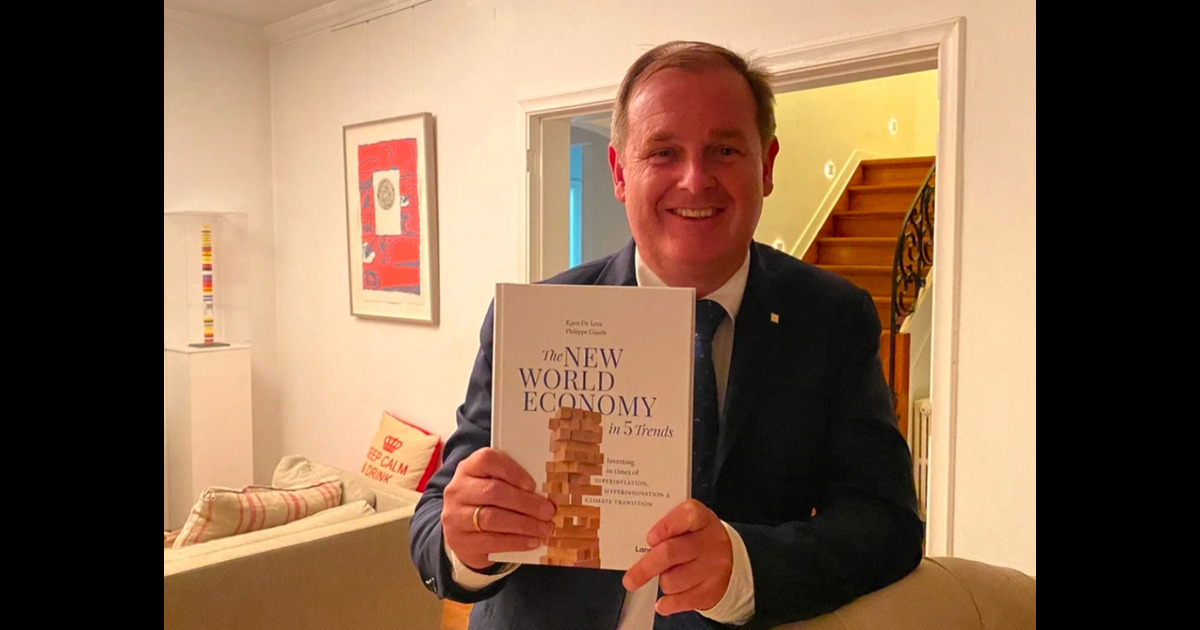
'Demographics is destiny and the hand that rocks the cradle rules the world': Philippe Gijsels
In an exclusive conversation with Prateek Shukla, the Chief Strategy Officer at BNP Paribas Fortis, Philippe Gijsels, speaks about his book "The New World Economy", the concept of "multi globalisation", debt, capitalism, and more:-
Q) Let's start with the root question -- what prompted you to write "The New World Economy"?
A) The main reason for writing this book is that we feel that the world is at a crossroad. As in the lyrics in the song by Dean Lewis " waves" : "It all comes and goes in waves, it always does" inflationary waves and interest rate waves tend to be very long.
The main idea is that the Covid period was a gateway into a totally new economic environment of higher interest rates. The drivers for this change are the 5 chapters in the book. 4 of the trends: multi-globalisation, debt, climate change and ageing are clearly inflationary. Innovation is the wild card and has the potential to be deflationary.
Still, the balance will clearly tip to the inflationary side. This means that companies, investors and governments will wake up in a totally different environment, in which the game will have totally different rules.
For companies it means that they will have to operate in an environment of higher inflation, higher rates and higher and more volatile commodity prices. This means that companies should more than ever consider hedging these risks. For investors, it means that cash will be more than ever unattractive as it will get inflated away. And that they will have to focus on real assets like equities, real estates, gold and other commodities. Governments will have to deal with higher interest rates and the bond vigilantes who are back in earnest and will attack the markets of countries that do not put their fiscal house in order. In a way we could conclude that the coming 25 years will resemble more the 60's and 70's than the period from 1982 until the covid period.
Q) You seem to have coined a term with "multi globalisation". Could you please explain it. Also, how relevant is globalisation after Covid which showed how dependence on a nation can be detrimental economically?
2/ The Covid period in a way killed the just in time concept and made the case for higher inventories. The multi globalisation concept takes this idea one step further. We do not call it de-globalisation because there will be another type of globalisation.
We will be living in a world that is no longer unipolar, revolving around the United States as the single super power. The world will be multipolar with the new upcoming world power China. Russia, which is still a military power, Europe that is trying to find its place. And a number of countries like India, Vietnam and Mexico (although this is more of a question mark in the new Trump era) that are well positioned to navigate this new multipolar world .
Still, this is also the world of the Fourth Turning as Neil Howe would put it. A world of great geopolitical turmoil and uncertainty. Add to that a lot of economical uncertainty and it is clear that markets will be quite volatile in the coming years as well.
Q) You made an argument against debt. But for a fast developing country like India, debt is a crucial instrument to propel growth. Do you not agree?
A) The high levels of debt will be an issue for quite a bit of countries around the world as interest rates will increase further and the bond vigilantes are back.
Still, this does not mean that countries should stop investing in innovation and infrastructure. Some debt and leverage is certainly defendable as long as the total debt does not increase too much and the debt is not used for transfers but for investments in the future. Each country will have to develop its own industrial policy. We can no longer talk about the emerging market complex. But we should look at it on a country by country basis. In this respect, a country like India is very well positioned.
Q) China and Japan are now dealing with an ageing demography -- so are several European nations. India still has about 25 years before we enter the "old men" club. Immigration keeps America and Canada young. What's your point of view on demographic dividend?
A) Demographics will play a very important role in years to come. The population of countries like Japan and China will be cut in half between now and 2100. In a lot of other countries (including many countries in Europe), will see their population age at a rapid pace.
Therefore countries like India, but also other countries in Asia and Africa will have a great demographic dividend. They will be able to grow faster while keeping inflation more under control. At the end of the day, demographics is destiny and the hand that rocks the cradle rules the world.
Q) A welfare society can only exist in a capitalistic system -- do you agree? Or are you a proponent of neo-capitalism?
A) it is not my role to express a political preference. But history has shown over and over again that a capitalistic system brings way more prosperity than a communist system. The situation in Nord and South Korea is a case in point. Without companies and individuals being innovative and creating added value a welfare state is impossible.
The big discussion point for many years to come will be how much redistribution of the wealth will there be and how much correction to the free market economy there will be.
Once again, the Fourth Turning comes to mind. This is also a period in which there will be a lot of turmoil within countries, a time that extremist parties from the left and the right win, and a centre that becomes smaller and weaker and unable to put in place the measures that are necessary. This once again guarantees a lot of political and market volatility.
Popular Categories
Read More Articles
Travel and Tourism
Travel to Thailand gets costlier: International passenger service fee to jump 53% from June by Awadh 360° Desk February 22, 2026Travel and Tourism
Thailand Extends Visa-Free Stay for Indians to 60 Days, Allows 30-Day Extension by Awadh 360° Desk February 19, 2026Travel and Tourism
Lucknow or Zaike: A City Remembered Through Taste by Mohammed Syed Zaid February 11, 2026Business
What's Up With WhatsApp? by Prateek Shukla February 9, 2026



